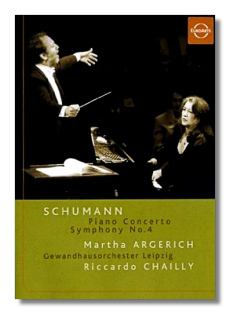
The Internet's Premier Classical Music Source
Related Links
- Schumann Reviews
- Latest Reviews
- More Reviews
-
By Composer
-
Collections
DVD & Blu-ray
Books
Concert Reviews
Articles/Interviews
Software
Audio
Search Amazon
Recommended Links
Site News
 DVD Review
DVD Review
Robert Schumann

- Piano Concerto in A minor, Op. 54
- Symphony #4, Op. 120
- Adagio & Allegro from Symphonic Etudes, Op. 13 (arr. Tchaikovsky)
- 4 Pieces from Carnival, Op. 9 (arr. Ravel)
- Von fremden Ländern und Menschen, from Kinderscenen, Op. 15
Martha Argerich, piano
Gewandhaus Orchestra Leipzig/Riccardo Chailly
Recorded Live June 1 & 2, 2006 at the Gewandhaus, Leipzig, Germany
EuroArts 2055498 Dolby Digital DTS LPCM Stereo Anamorphic Widescreen
This all-Schumann concert is quite a stunning event to behold, both musically and visually. While it is about Schumann and is mostly orchestral (even if some of the orchestral works are piano pieces arranged byTchaikovsky and Ravel), and is led by the dynamic conductor Riccardo Chailly, the central figure in the concert is, let's face it, Martha Argerich. She is one of the few truly charismatic musicians of our age, one whose presence onstage can generate a sudden mesmerism from the audience, as they begin to watch and listen in rapt silence. Some have called her the greatest female pianist ofthe day. A few might take it further, calling her the greatest pianist of all time, man or woman.
I won't make such extravagant claims about any pianist – there are too many good ones. Of course, Argerich has always possessed a spectacular technique: from the beginning of her career she could play octaves faster than Horowitz and dazzle audiences with her stunning speed in the thorniest passages. Interpretively too, she always displayed a dynamism in presenting her own imaginative take on a wide variety of repertory, from Bach to Prokofieff. But she could be quite fallible in her tendency to rush things, blurring or slighting secondary lines or inner voices, or in her tendency to sometimes dilute the brawnier elements in a score or to produce a less imposing sound in general.
Argerich's Schumann Concerto here divulges neither the super-virtuoso nor the slapdash side of her artistic persona. Instead, the listener hears the mature pianist deliver a solid, interpretively vital performance to rank with finest recorded accounts of this work to appear in recent times. This is a slightly broader reading than Argerich's performance on DG with Rostropovich, from 1978. In the EuroArts/Leipzig concert here, the first two movements are longer by about a minute each, but the finale is dispatched at roughly the same speed. On the whole, I prefer this new account over the older one, though both are excellent. Much of Argerich's recent work seems interpretively more consistent, with the pianist adopting slightly broader tempos while retaining her typically fiery style.
Of recent vintage, the Pollini/Abbado (1990) and the Pires/Abbado (2000), both on DG, offer splendid, though somewhat different performances of the Schumann (Pires is broader and grander), and from the distant past the Jörg Demusrendition on a 1950s Westminster LP and the Van Cliburn/Reiner (RCA), from about 1960, also offer strong alternatives, though I doubt the Demus has recently been available.
By the way, Argerich plays one encore, Von fremden Ländernund Menschen, from Kinderscenen. It's a fine performance and rather reflects the pianist's maturity: in her younger days, I can only imagine that she would have played the stormier audience-pleaser, the Schumann Toccata. At any rate, for the many fans of Argerich, as well as for fans of the Schumann Concerto, this performance is a must.
The Schumann Fourth Symphony (which was actually the composer's second symphony) gets a fine reading from the insightful Chailly, who has recently left the highly-coveted position of music director of the Amsterdam Concertgebouw to take over the somewhat less prestigious post in Leipzig. Many of his fans were mystified by this decision, by this seeming step downward. But he leads a fine ensemble here and may well elevate his Leipzig band to world-class status before long. His tempos in the symphony are judiciously chosen and the orchestra responds with spirit and accuracy. The flute, oboe and clarinet players turn in especially excellent work, and on the whole, I would say the Leipzig group – at least in this symphony – performs at or near the level of the Concertgebouw.
The other works are arrangements of various Schumann piano pieces by Tchaikovsky and Ravel. They are played admirably, but are of less interest – at least to me, since the works are clearly better in their piano versions. The sound reproduction is vivid and well balanced in all performances, and the camera work imaginative and well-conceived. All in all, highly recommended.
Copyright © 2006, Robert Cummings




















